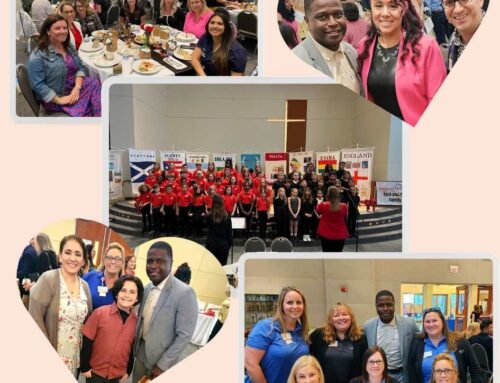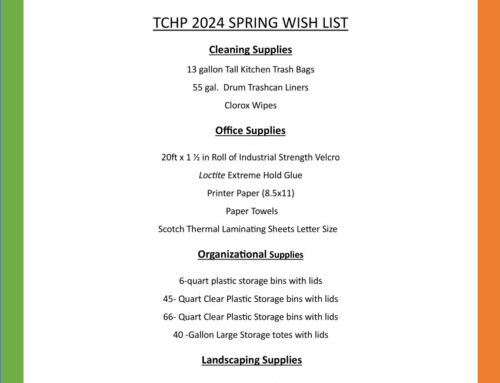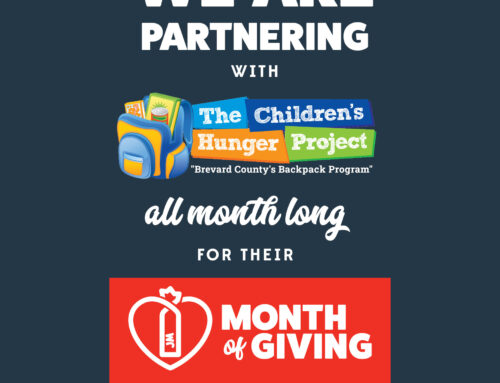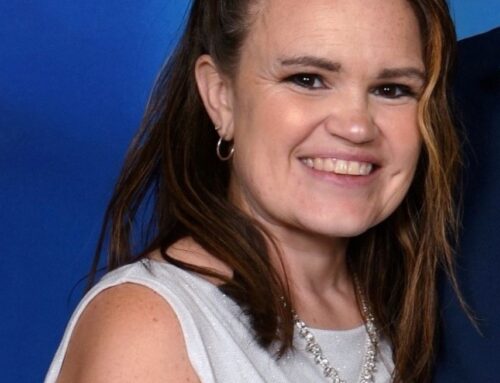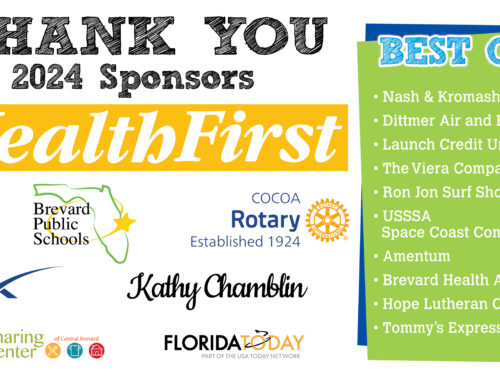 Listen to the discussion children going hungry, what may surprise some people that this occurs in our area. Listen in, get inspired, and find out how you can help make a difference in feeding a hungry child. Click here to listen to the podcast.
Listen to the discussion children going hungry, what may surprise some people that this occurs in our area. Listen in, get inspired, and find out how you can help make a difference in feeding a hungry child. Click here to listen to the podcast.
Kim’s takeaway: By allowing the teachers to identify kids in need, they are able to help children and families who might otherwise fall through the cracks. This was spotlighted in a story where a woman told Keith that the food from The Children’s Hunger Project fed their family on the weekends. In this case, her husband had accepted a job, moved to the area and then the job was dissolved. The were living in their car until he could find another job. When she spoke with a CHP representative, her husband was again employed and all was well.
Don’t think everyone who needs help is a “bum”. Note I put that word in quotes, because it truly isn’t one I use. Anyone can have a bad situation occur and need help.
Even if you have a situation where parents make bad decisions, it’s okay to advocate that the young children receive help.
Keith credits the area’s strong faith based community with helping the project’s success. From volunteers packing food packs to money to provide food, our local faith groups have embraced the mission.
It only takes $150/year which can be broken into a recurring monthly fee of or $12.50 a month on a recurring charge to feed 1 child for the whole school year. If you’ve heard of set it and forget it, this is the optimal way to give. You’ll feed a child and may not notice the $12.50 monthly coming out of your bank account. Adjust with a few less coffees or fast food items and you’ve done good for yourself and the community.
Transcript of Kim Shivler’s Interview with Keith Gee of The Children’s Hunger Project
Kim: 00:00 You’re listening to Space Coast Stories, a podcast with interviews and stories from people and businesses on Florida’s Space Coast. I’m your host, Kim Shivler. Thanks for joining me.
Kim: 00:15 Hey everybody, this is Kim Shivler. Thank you for joining us today on Space Coast Stories, today. I’m here with Keith Gee at The Children’s Hunger Project in Cocoa. Welcome Keith.
Keith: 00:26 Thank you. Great to be here.
Kim: 00:28 So tell us a little bit about The Children’s Hunger Project
Keith: 00:31 Sure. The Children’s Hunger Project was founded eight years ago in 2010 by three gentlemen that realized the kids were actually going hungry here on the weekends. So the kids we serve are elementary school kids that get breakfast and lunch Monday through Friday as part of the free lunch program, the national free lunch program. The problem is that lunch on Friday is oftentimes the last nutritious meal they get until Monday morning when they come back to school. So some kids are literally going 68 hours without proper nutrition. They come back to school on Monday and there’s just no way they’re going to be successful.
Keith: 01:06 So we put together a packet of food and we deliver it to the schools and we started serving 27 kids at Riviera elementary school down in Palm Bay eight years ago and we, we didn’t have a lot of resources back then, so we followed something that Mother Theresa once said and she said, if you can’t feed 100 people feed one, and to me that means if you see a problem, get off your duff and do something about it. And so that’s what we did. We started feeding 27 kids every week with a packet of food for the weekends and today we have grown exponentially every year and we’re up to feeding 2000 kids every week at 45 elementary schools all over Brevard County.
Kim: 01:47 That’s amazing. And it is something that you brought up that, that I really want people to think about. I was listening to a podcast this morning and the gentleman was saying, you know, here in the Western world, pretty much all of our Maslow’s Hierarchy of basic needs, food, shelter, et cetera, is already taken care of. We only have to worry about the others. I think many of us take for granted that that’s true and in fact right here in our own backyard, we have a lot of people who that’s not true for.
Keith: 02:17 Yeah, it’s easy to imagine people going hungry in Guatemala and Afghanistan and places like that, but right here in Brevard County where we launch rockets out of our backyard and we have 72 miles of beautiful coastline that people come from all over the world to see and yet kids are still going hungry here. We know of kids that we serve that are literally surviving on water for the weekends until they got on our program and got our packets and then you would wonder why they come to school Monday morning and there’s no way they’re going to be ready for class. Yeah, yeah. They’re going to be sick more often.
Keith: 02:54 It’s going to take them longer to recover. They’re going to be more prone to behavioral and emotional and I actually, there’s a study out that kids that don’t eat breakfast before they come to school test on average 17 points lower and math skills. That’s two grade levels just because they didn’t eat breakfast. So imagine coming to school on Monday after having not eaten since Friday and expected to be successful on a test or something. There’s just no way.
Kim: 03:19 What is your percentage of growth over the years? Does it change? Is it exponential or do you see changes, you know, based on local economy, etc. Well, we’ve grown tremendously actually, largely because of the faith based community here. Some churches and other organizations have gotten behind our mission With volunteers and by providing donations unfortunately the need is also increasing. Actually we’re just looking at the numbers of free lunch populations of the schools we serve and every school we serve had an increase from last year to this year in the amount of kids that are eligible for the free lunch program.
Keith: 03:57 So it feels kind of like we’re chasing our own tail at sometimes, but our growth happens basically based on money. So the more money we have, the more kids we can feed. So the packet of food that we put together cost on average $4 per kid per weekend. So it costs $150 to feed one kid for the entire school year, and the way we do it is at the beginning of the school year, we set aside a certain amount of money and that’s how much money we have to spend on food. So we make a commitment to those kids to serve them for the entire year. So we already have that money set aside so we will never get to February or March and say, oops, we’re out of money now. So we have. We have an allocated that money set aside specifically for purchasing that food for the year.
Keith: 04:47 So once we make a commitment to that kid, they’re going to get food until the end of the school year.
Kim: 04:52 Now when you have a case like this where you came back this year, we’ve just come back into the school year, really over the last month and you see that there’s a large need. You have several programs which we’re going to talk about for people to help to donate, etc. Are you able to adjust and add more during the year for those people? If you can get, for example, you had a monthly sponsorship where we could log on and sponsor a child every month. Are you able to make adjustments on the fly for that during the year?
Keith: 05:23 Yes we do. And and honestly our schools typically we’ll come back to us after the first month or several weeks into the school year and say, oh my gosh, we’ve got four more kids that really need the program because they’re still trying to figure out who’s in their class and who’s at need.
Keith: 05:40 And, and so they will typically come back to us and say we need x number of more packets of food. So we do our best to to help that. One of the, one of the ways we’re able to do that is I mentioned the $150 to feed a kid for the entire year. That breaks down to $12 and fifty cents monthly on a recurring donation. So if you make a $12 and fifty cent recurring monthly donation to us, we feed another kid. And so that way we’re able to add more kids onto our program during the course of the year.
Kim: 06:15 Excellent, and we will put all the links to sponsorship and and other programs that Keith is telling us about on the website so that I, if you want to get involved, this is a great way to give locally. I think many of uS grew up watching the adopted child in in like you said, Guatemala and different places, which is fabulous, but sometimes I think we overlook our own backyard and how good does that feel to be able to actually be helping your neighbor, which is what you’re doing.
Keith: 06:47 Especially here in Brevard County. I think it’s easy to perhaps go through life with blinders on and not see the need because we live in such an affluent community, but there are certainly pockets of need, but sometimes that need bus out of those pockets and is really. We’re. We’re serving schools as far north as Mims and all the way down to Sunrise Elementary School, which is the very bottom of Brevard County. We serve schools in Merritt Island, beach side. I mean it is all over the county that there’s a need.
Kim: 07:22 This was very eye opening for me when I met you because I think not, not that you don’t know that there are people with needs, but a lot of times we focus on urban areas. You know, when I go to Philadelphia, which I do often, or New York or DC, it’s much easier to see sometimes a particularly Philadelphia with, you know, being that it’s a sanctuary city, you see a lot of homeless people and so you get into some of these other areas and we just forget that there are people who are in need and it doesn’t even mean that they’re homeless on the streets.
Kim: 07:57 These are working people a lot of times they can’t just can’t cover those day to day every single thing they need to cover. Right?
Keith: 08:05 Yeah, and there’s some reasons for that. Clearly affordable housing is an issue here in Brevard County. Some families are spending 65 percent of their monthly income on rent, so if you’re a single parent and raising two or three kids, it doesn’t leave a lot for food, clothing, transportation, utilities, everything else that goes into raising a family. So that’s something that we’re going to have to address. I mean, rent, if you don’t own a home, you are paying premium dollar for rent and it’s really putting the uh, budgets in jeopardy of a lot of families here. Obviously I will never condone parents that just make bad decisions. If you get hooked on drugs and you don’t feed your kid, that’s a bad decision if you’re buying flat screen tvs and new cell phones and not making sure that your kids have what they need, that’s a bad decision and I’ll never understand how parents make those decisions and, and, uh, the effect that it has on those kids.
Keith: 09:06 But I’m certainly not going to sit by idly and let those kids go hungry because their parents aren’t able to do it. Certainly there are some families that are just struggling and they’re trying to do their best and it’s, it’s just really tough. And those are the families that, uh, that need our help. Absolutely. Especially with. I didn’t realize that, that the percentages were that much around home ownership or home renters ship. and even ownership has gone way up over over my lifetime because I know when I was raised it was always 33 percent you were aiming for for your housing. Yeah. So 60 plus percent. How do you easily fit everything else in if that’s how high vic the cost differentiation was? Yeah, it’s, it’s a struggle and it’s a, you know, again, there are parents that are trying to do the right thing and working two jobs to try to create a better situation for their family.
Keith: 10:05 But I, I honestly believe that our packet of food is the answer like it is. It is that simple because we can break. There’s something called the cycle of poverty and we can break this cycle. The way the cycle works is if I don’t graduate from high school, chances are my kids won’t graduate from high school and I’ll struggle to find a job, maybe make minimum wage or barely above. And I will struggle the, my rest of my life putting the resources together for my family. My kids won’t graduate from high school. They will go on to work part time are a minimum wage job. Struggled to provide for their family, chances are their kids will not graduate from high school, get a minimum wage job, struggled to provide for their family, and that cycle continues and by making sure that these kids, when they’re in elementary school, have the nutrition that they need on Monday morning when they come to school on Monday, they’re ready to be successful, they’ll get better grades in school, go on and have a better chance at graduating from high school, maybe even go on to a tech school or some college and have more options in their life to be able to provide more resources to their family.
Keith: 11:23 And so I think we could literally break that cycle of poverty here in bravard county. So that’s your big vision. It’s not even just dissed about a packet. It’s about using those packets to break a cycle. Absolutely. Yeah. And give these kids more options in life so that they can provide for their families once they get to that stage in life. That’s a big vision and a great vision. So then tell us a little bit as community members, we are listening to this and we want to get involved, kind of mentioned the sponsorship and the. What else do you have that that’s helpful? Sure. So just a little more on that. That monthly sponsorship, we call it the feed 500 campaign. So we’re asking 500 people to step up at $12 and fifty cents a month to help us feed 500 more kids and once we get to that, we’re feeding 2000 kids right now.
Keith: 12:13 We estimate the needed over 3000 kids in our county that need this service. So we’re trying to get 500 more of them on our programs, so that we can better serve them. We also have other events. We have a five k race. It’s the fight child hunger, five k coming up on saturday, January 12th at high school. Race starts at 8:00. There’s a free pancake breakfast afterwards. There’s a live band, there’s lots of activities involved with that. It’s a great family friendly. You can walk, you can run, you can bring your dog. It’s just a great event. We have a lot of school age kids that participate in that. Of course we’ve got some real competitive runners that come in and run as well. That’s a great run, a great event and uh, it’s $25 to register for it. All of the money that we raise goes to feed hungry kids.
Keith: 13:07 So 100 percent of the proceeds. It’s actually a joint fundraiser between the Sharing Center of Central Brevard and The Children’s Hunger Project. So we both use all of the money raised through that event to feed hungry kids here in Brevard County. So we encourage the entire county to come out and participate with that. We also do a golf tournament in April at a Viera East Golf Club and that’s a great time for people that are into golf that, uh, that want to have a great time and also want to help us raise money so that we can feed more kids. But most of the events that we’re involved in, those are the two kind of in house events that we do each year. Most of the events are other people having events and they want to send some of the proceeds or all of the proceeds from their event to help feed kids and so they get the children’s hunger project involved and that happens almost weekly and it’s awesome.
Keith: 14:01 The support that we have, all of our food is packed by volunteers. It’s all delivered by volunteers. We need 40 volunteers every Thursday night to pack up those 2000 packets of food and we have a great support through churches, service clubs, companies, individuals that just want to come out for a couple of hours and pack food on Thursday night. So, um, I encourage you to go to our website at thechildrenshungerproject.org And you can find out more about our events. You can find out more about donating and you can find out more about getting involved as a volunteer. We always need help. Um, we have a full warehouse full of pallets and boxes of food that all. it seems like it always needs something to be moved around or the truck needs to be loaded or you know, food needs to be prepped for our next packing session.
Kim: 14:49 So we’re always looking for people to help and I want to point out two things and then I have one more question for you are a couple more questions if you’re not a runner. So I am one of those people who I am only running if someone’s chasing me, but you can still participate in these. You can still buy a ticket registered, go out to these events.
Keith: 15:07 They’re really can be great community events. No one judges you if you don’t put on your sneakers and get out on that pavement. I have noticed that actually what are the things we’re doing this year for the first time ever is we’re doing a food packing right onsite at Viera High School right after the race. So if you want to come out and not participate in the walk or the run, but just come out and help you can do that there as well.
Kim: 15:31 And you mentioned, I’ve been to a couple of these events you mentioned where it was somebody else’s event, but they’ve used it to also benefit the children’s hunger project. Tell me a little bit about how, you know, what they’ve done with that. It’s not always just money. Correct? Correct. And if someone is doing an event because we have a lot of events and provide, if someone was doing an event or putting on an event and they wanted to do something, how would they connect with you and what are some ideas they could implement? Sure. The events range the gamut. Sometimes the real small events that raise a couple hundred dollars and we love that and there’s other events that raise thousands and even tens of thousands of dollars to help us. So we, we just love getting the community involved. They, if you’re interested in something like that, you can just call our office.
Keith: 16:20 The number is on the website at thechildrenshungerproject.org. And I’m just talk to about, talk to us about what you want to do, what your event looks like. and, um, you know, how, how, uh, you know, if it’s, it’s if you want to give all the proceeds to us or if you want to split it between number a number of different groups.
Kim: 16:40 I love the fact that, that Brevard County supports this whole heartedly and as you mentioned, there’s several events a seemingly every month that do donate money to the to help help us feed more kids. So it’s awesome. Well, thank you so much for being here with me today, Keith. We’re going to put all of these links on there on our website as well as of course, linked to the children hunger, children’s hunger project site. Any last words for people, if they’re thinking about this or what you would say to them to just help them take that next step?
Keith: 17:16 Sure. one of the things that I think is important is these are kids that you see every day. They may not look hungry, but they’re the kids. You see, if you go to Publix or Walmart, if you’re shopping in a store with with your kids and you, I mean your kids probably know of someone who is going hungry. The vast majority of teachers that I know personally all have a little cabinet or a drawer full of food that they keep in their classroom because they know their kids are going. It’s something that I can’t believe is that big of a problem here in Brevard County, but it is, and we can stop this. This is purely, I think if people understood the scope of this problem and the extent of what this is going to mean to our county in the future, we would just take care of this and make sure that every kid has fed. We just need to do a better job of building awareness and that’s why we’re together today is to talk about this so that we can feed more.
Kim: 18:21 Absolutely. Thank you so much for being with me today, keith. Thank you so much and everybody on the space coast. Thanks for joining us. I’ll see you next episode with another interesting person in our area, bye.
Kim: 18:35 Join us next time for another episode of Space Coast Stories. You can find the show notes and other information at SpaceCoastStories.com. The views of the guests on this show are their own and don’t necessarily represent the views of the show owners, host or company. Thanks for listening to Space Coast Stories.


